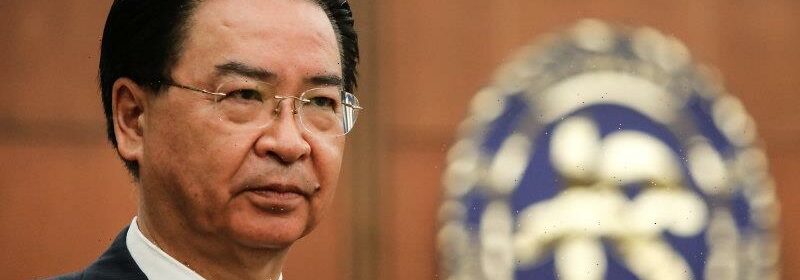Taipei warns China’s ambitions go beyond Taiwan, calls for allies to escalate military engagement

Singapore: Taiwan’s Foreign Minister says the island is the last obstacle standing in the way of China’s determination to link the East and South China seas and expand its reach into the Pacific.
In his first major comments since Beijing’s response to US House Speaker Nancy Pelosi’s visit to Taipei plunged the Taiwan Strait into its worst crisis in decades, Joseph Wu said China had used the drills as “a military playbook to prepare for the invasion of Taiwan” and urged countries to escalate their military engagement to protect the median line.
Taiwan’s Foreign Minister Joseph Wu.Credit:Daniel Ceng
“China’s targeted large-scale military exercises are a serious provocation,” he said. “China’s real intention behind these military exercises is to alter the status quo in the Taiwan Strait and the entire region.”
Beijing on Monday night accused Australia of undermining regional peace and stability by criticising China’s military drills in the Taiwan Strait.
Wu said Taipei was concerned that Beijing could order an invasion of Taiwan but that the Taiwanese military had been preparing for the possibility of attack for years.
On Tuesday, the Taiwanese army began live-fire drills designed to simulate a defence against any future attempt to capture the island. The artillery exercises in Pingtung county have been calibrated to avoid escalating conflict with Beijing by keeping them within Taiwan’s borders. China on Monday extended its military drills for a day by launching anti-submarine and sea assault operations in the Taiwan Strait.
Taipei has also been combatting escalating cyberattacks, disinformation campaigns and economic coercion over the past week, but Wu said the Taiwanese people had shown they could remain calm in the face of the most serious missile threats since 1996.
“The reaction of the Taiwanese people and the Taiwanese government is that we stay resilient,” he said. “The best way to deal with a regime which is trying to intimidate us is to show that we are not intimidated.”
He said the People’s Liberation Army exercises had violated Taiwan’s rights under international law as China accuses Australia, the United, France and Japan of putting regional stability at risk by criticising its actions in the Taiwan Strait.
“The people of Taiwan have the right to express their collective will through a democratic system. China has no right to interfere in or alter this.”
China views neighbouring Taiwan as a province of the mainland even though it has never been ruled by the Chinese Communist Party. It has vowed to unify the island with China by 2049 and has engaged in a decades-long campaign of hybrid warfare designed to undermine Taiwan’s confidence that it could survive an attack in the hope of surrender. The island is also situated on a critical strategic line between China and the Pacific, that if captured would allow China to quickly launch submarines deep into the ocean to attack US bases.
Wu said Taiwan was grateful for the international support it had received since Pelosi’s visit but also wanted to make clear that Taipei believed Beijing’s ambitions were not limited to taking the self-governed island of 23 million people.
“China is now determined to link the East and South China Sea through the Taiwan Strait so that this entire area becomes internal waters. Its intentions are not likely to stop there,” he said.
Wu said China’s April security deal with Solomon Islands and its failed pursuit of a Pacific-wide agreement in May showed Beijing was becoming more ambitious than the Taiwan Strait.
“China’s behaviour towards Taiwan is merely a pretext, its ambitions and impact extending far beyond Taiwan. It is thus critical that all freedom-loving countries around the world should work together to explore means to respond to the expansion of authoritarianism in Beijing.”
He said the best way to ensure that China’s incursions over the median line did not become more regular was for countries including Australia to conduct more freedom of navigation exercises in the Taiwan Strait. Australia does conduct freedom of navigation exercises in the area, but more regular deployments would raise the risk of accidental disputes after incidents in the past year including flares and chaff being fired at an Australian air force plane by a Chinese fighter jet in May.
China’s Foreign Ministry on Monday night accused Australia, the United States and Japan of undermining the international order through attempts to “distort, fudge and hollow out their one-China commitment”. Canberra, Washington and Tokyo maintain their own “one-China” policies, which acknowledge China’s claim to Taiwan without endorsing it.
Australia was singled out on Tuesday for criticism by Beijing’s foreign affairs spokesman Wang Wenbin after a relatively stable period of relations between the two countries since the May federal election.
“The Australian side, in disregard of facts, have wantonly criticised China’s legitimate, justified and lawful measures to safeguard its sovereignty and territorial integrity,” said Wang.
China’s Foreign Ministry spokesman Wang Wenbin.Credit:AP
“Australia’s act violates the purposes and principles of the UN Charter, grossly interferes in China’s internal affairs, and undermines regional peace and stability.”
Wang urged the Australian government to refrain from “echoing or assisting certain countries’ misguided strategy of using the Taiwan question to contain China, and avoid creating new obstacles for China-Australia ties”.
Foreign Minister Penny Wong described China’s exercises as “disproportionate and destabilising”.
“It is in all our interests to have a region at peace and not in conflict. Australia does not want to see any unilateral change to the status quo across the Taiwan Strait,” she said.
Most Viewed in World
From our partners
Source: Read Full Article

